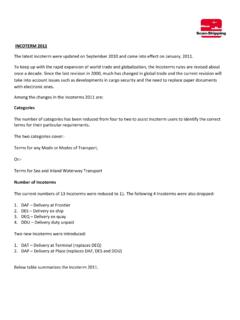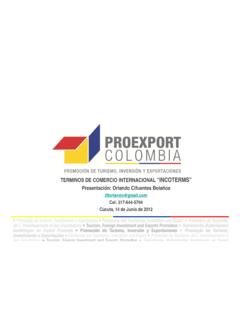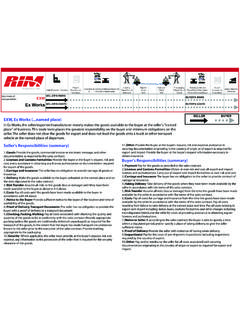Transcription of Rules for Any Mode(s) of Transport
1 Rules for Any Mode(s) of TransportThe seven Rules defined by incoterms 2010 for any mode(s) of transportation are:EXW Ex Works (named place of delivery)The seller makes the goods available at its premises. This term places the maximum obligation on the buyer and minimum obligations on the seller. The Ex Works term is often used when making an initial quotation for the sale of goods without any costs included. EXW means that a seller has the goods ready for collection at his premises (works, factory, warehouse, plant) on the date agreed upon. The buyer pays all transportation costs and also bears the risks for bringing the goods to their final destination. The seller doesn't load the goods on collecting vehicles and doesn't clear them for export. If the seller does load the good, he does so at buyer's risk and cost. If parties wish seller to be responsible for the loading of the goods on departure and to bear the risk and all costs of such loading, this must be made clear by adding explicit wording to this effect in the contract of Free Carrier (named place of delivery)The seller hands over the goods, cleared for export, into the disposal of the first carrier (named by the buyer) at the named place.
2 The seller pays for carriage to the named point of delivery, and risk passes when the goods are handed over to the first - Carriage Paid To (named place of destination)The seller pays for carriage. Risk transfers to buyer upon handing goods over to the first Carriage and Insurance Paid to (named place of destination)The containerized Transport /multimodal equivalent of CIF. Seller pays for carriage and insurance to the named destination point, but risk passes when the goods are handed over to the first Delivered at Terminal (named terminal at port or place of destination)Seller pays for carriage to the terminal, except for costs related to import clearance, and assumes all risks up to the point that the goods are unloaded at the Delivered at Place (named place of destination)Seller pays for carriage to the named place, except for costs related to import clearance, and assumes all risks prior to the point that the goods are ready for unloading by the Delivered Duty Paid (named place of destination)Seller is responsible for delivering the goods to the named place in the country of the buyer, and pays all costs in bringing the goods to the destination including import duties and taxes.
3 This term places the maximum obligations on the seller and minimum obligations on the for Sea and Inland Waterway TransportThe four Rules defined by incoterms 2010 for international trade where transportation is entirely conducted by water are:FAS Free Alongside Ship (named port of shipment)The seller must place the goods alongside the ship at the named port. The seller must clear the goods for export. Suitable only for maritime Transport but NOT for multimodal sea Transport in containers (see incoterms 2010 , ICC publication 715). This term is typically used for heavy-lift or bulk Free on Board (named port of shipment)The seller must load themselves the goods on board the vessel nominated by the buyer. Cost and risk are divided when the goods are actually on board of the vessel (this rule is new!). The seller must clear the goods for export. The term is applicable for maritime and inland waterway Transport only but NOT for multimodal sea Transport in containers (see incoterms 2010 , ICC publication 715).
4 The buyer must instruct the seller the details of the vessel and the port where the goods are to be loaded, and there is no reference to, or provision for, the use of a carrier or forwarder. This term has been greatly misused over the last three decades ever since incoterms 1980 explained that FCA should be used for container Cost and Freight (named port of destination)Seller must pay the costs and freight to bring the goods to the port of destination. However, risk is transferred to the buyer once the goods are loaded on the vessel (this rule is new!). Maritime Transport only and Insurance for the goods is NOT Cost, Insurance and Freight (named port of destination)Exactly the same as CFR except that the seller must in addition procure and pay for the insurance. Maritime Transport terms eliminated from incoterms 2000 DAF Delivered At Frontier (named place of delivery)This term can be used when the goods are transported by rail and road. The seller pays for transportation to the named place of delivery at the frontier.
5 The buyer arranges for customs clearance and pays for transportation from the frontier to his factory. The passing of risk occurs at the Delivered Ex Ship (named port of delivery)Where goods are delivered ex ship, the passing of risk does not occur until the ship has arrived at the named port of destination and the goods made available for unloading to the buyer. The seller pays the same freight and insurance costs as he would under a CIF arrangement. Unlike CFR and CIF terms, the seller has agreed to bear not just cost, but also Risk and Title up to the arrival of the vessel at the named port. Costs for unloading the goods and any duties, taxes, are for the Buyer. A commonly used term in shipping bulk commodities, such as coal, grain, dry chemicals - - - and where the seller either owns or has chartered, their own Delivered Ex Quay (named port of delivery)This is similar to DES, but the passing of risk does not occur until the goods have been unloaded at the port of Delivered Duty Unpaid (named place of destination)This term means that the seller delivers the goods to the buyer to the named place of destination in the contract of sale.
6 The goods are not cleared for import or unloaded from any form of Transport at the place of destination. The buyer is responsible for the costs and risks for the unloading, duty and any subsequent delivery beyond the place of destination. However, if the buyer wishes the seller to bear cost and risks associated with the import clearance, duty, unloading and subsequent delivery beyond the place of destination, then this all needs to be explicitly agreed upon in the contract of sale.








